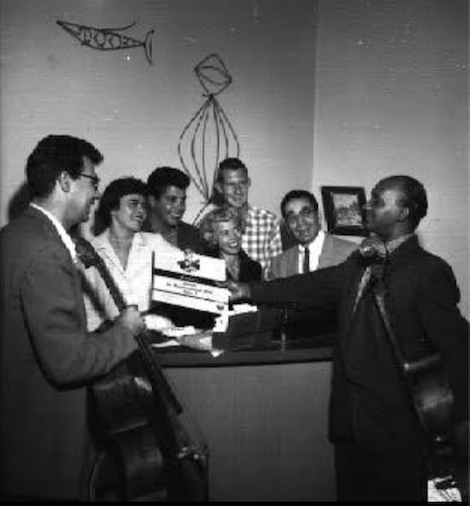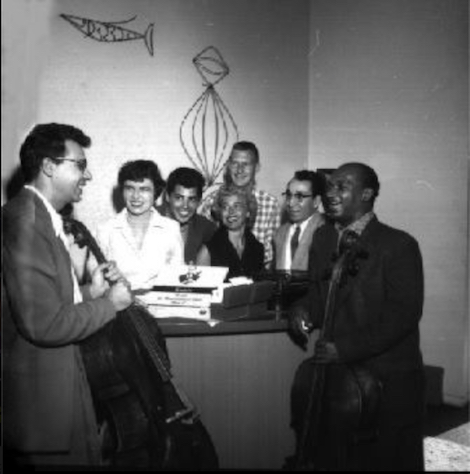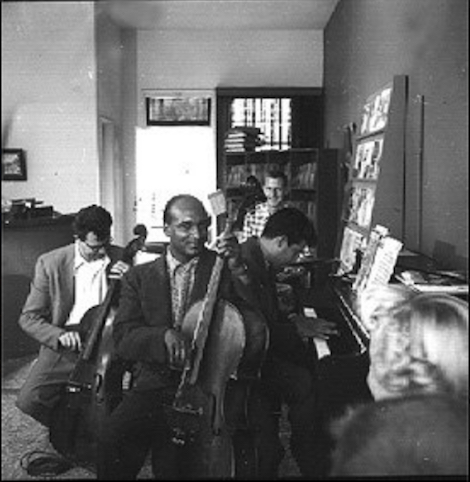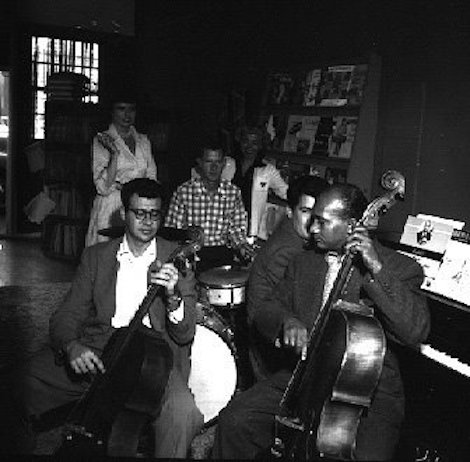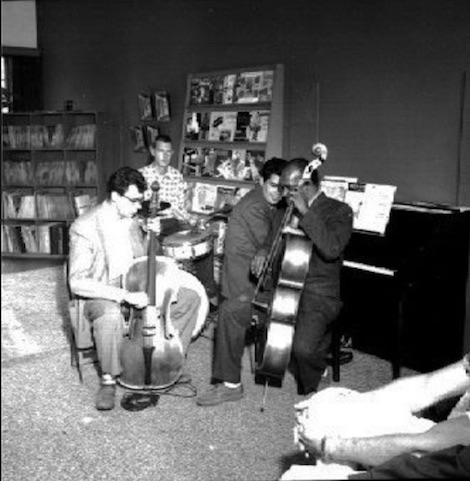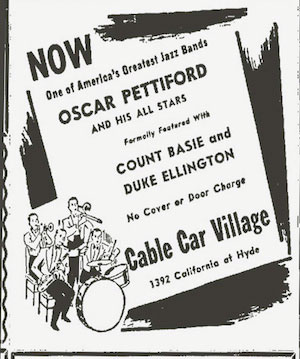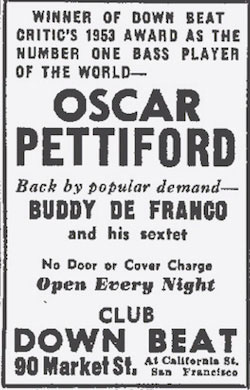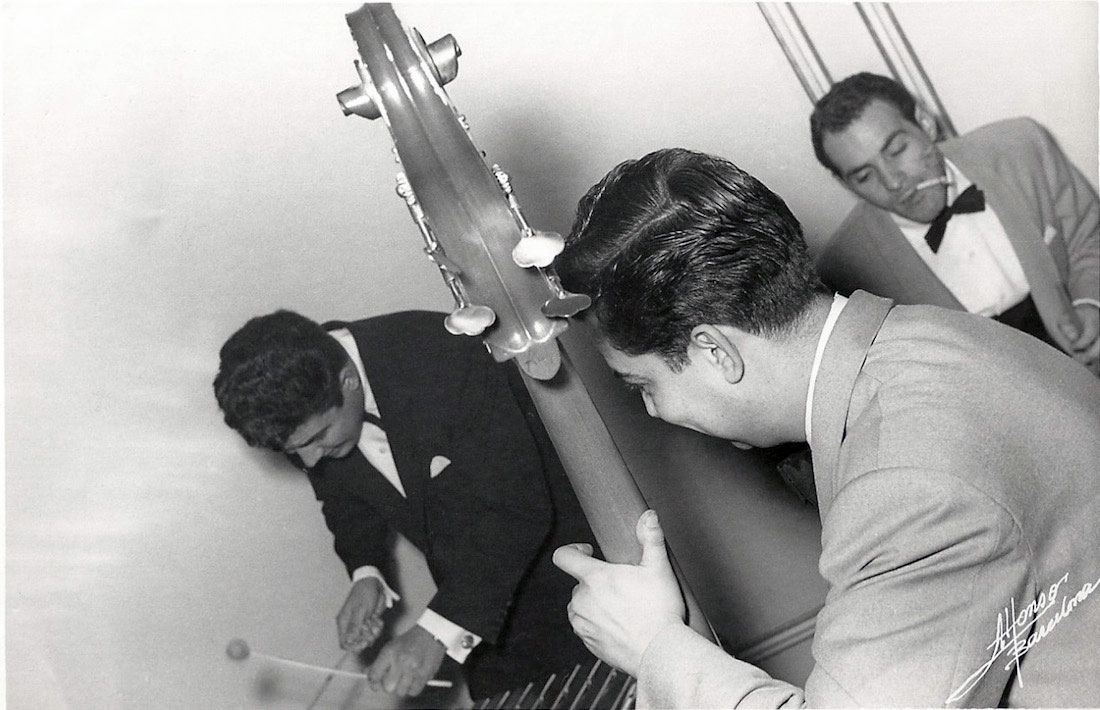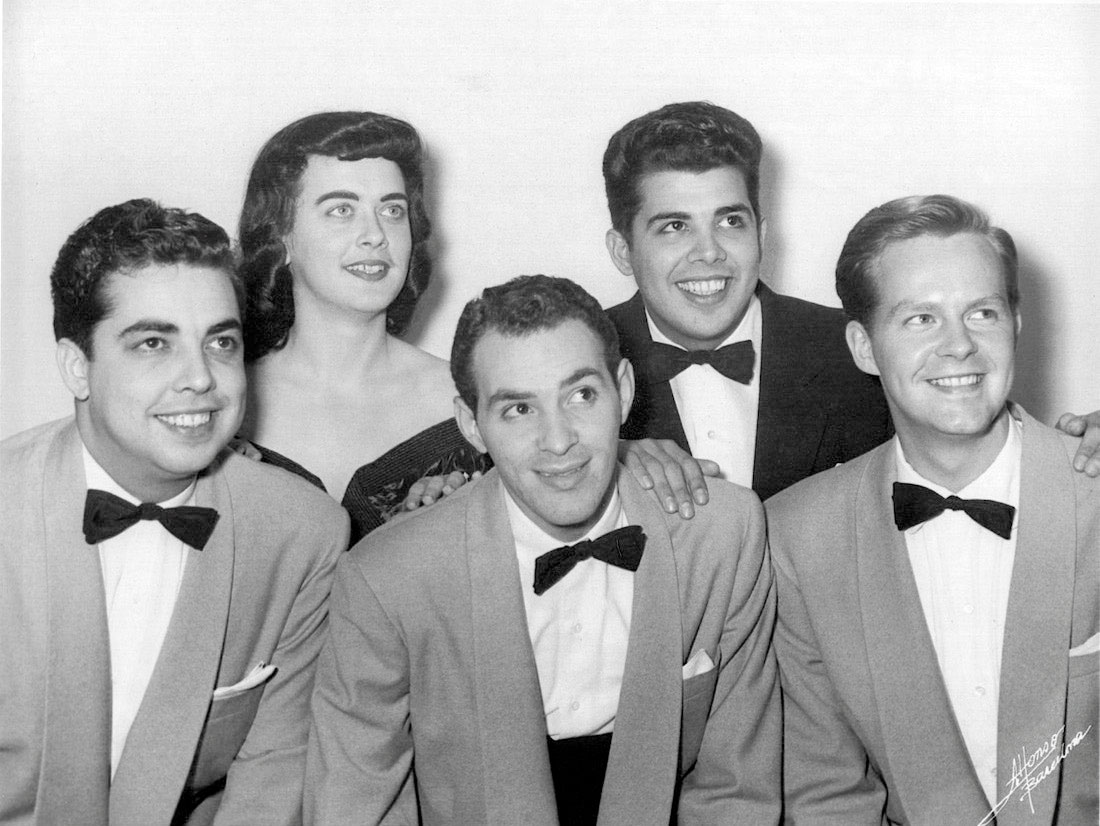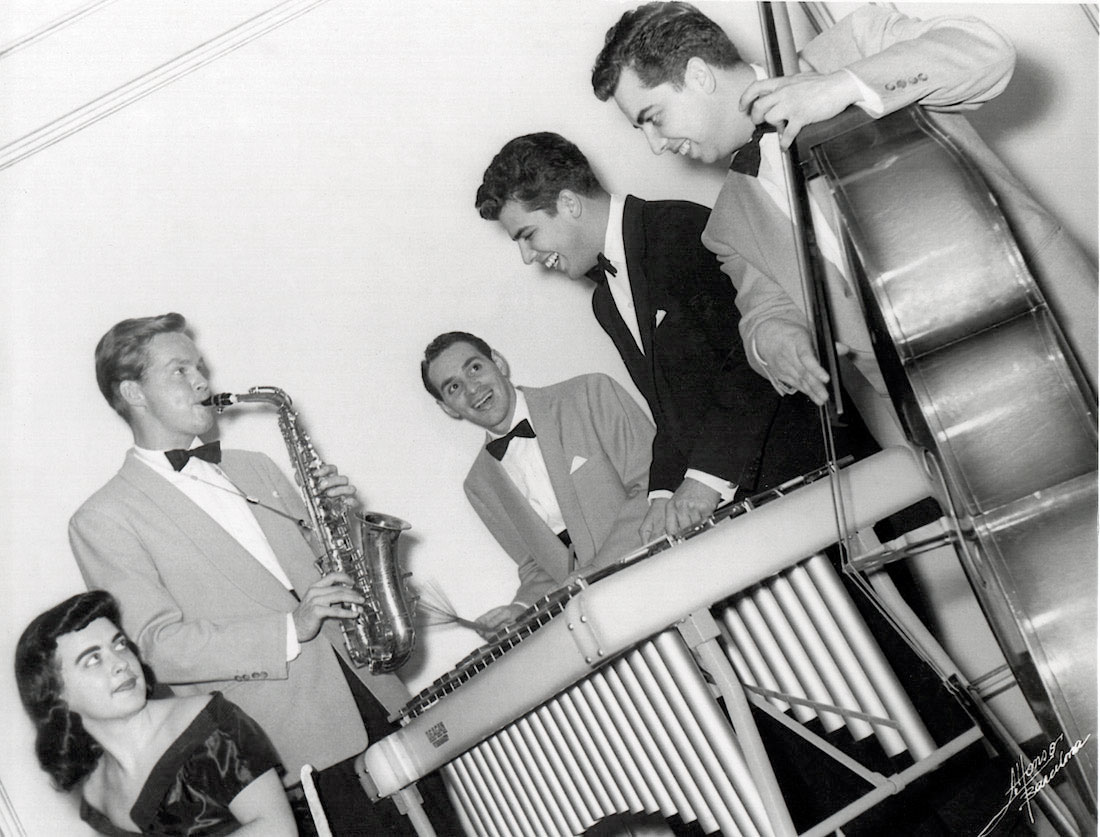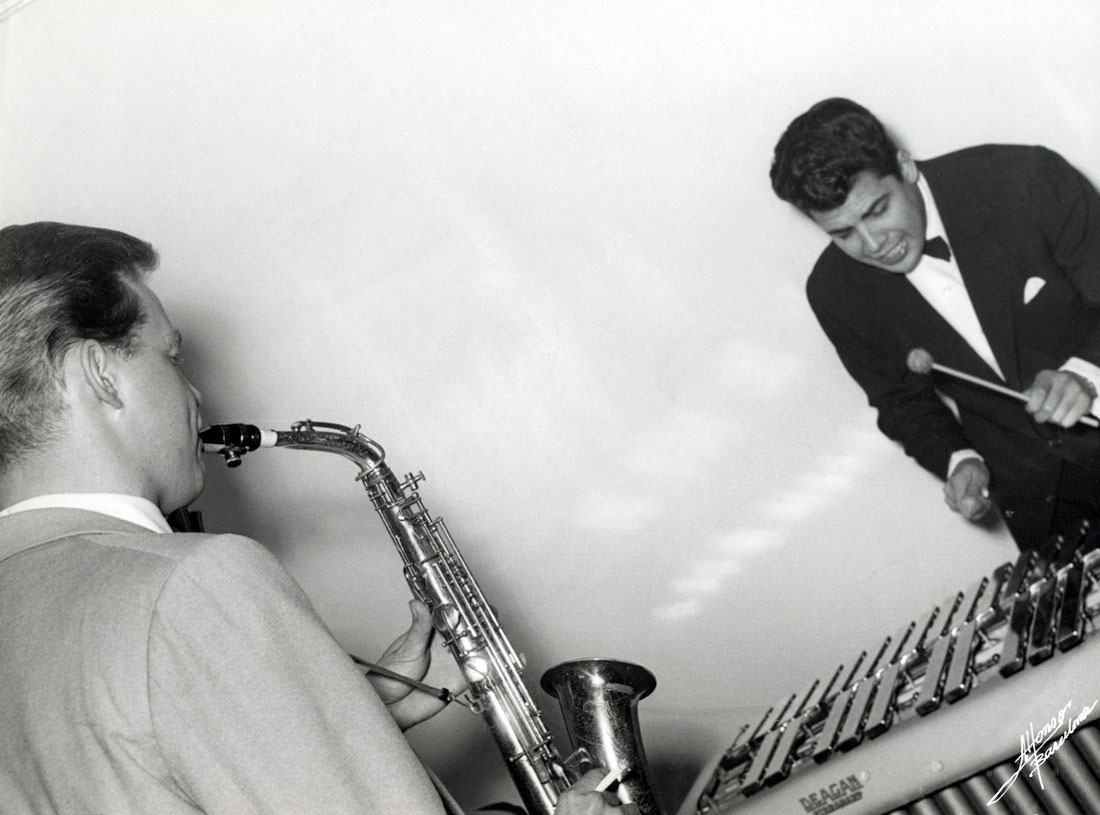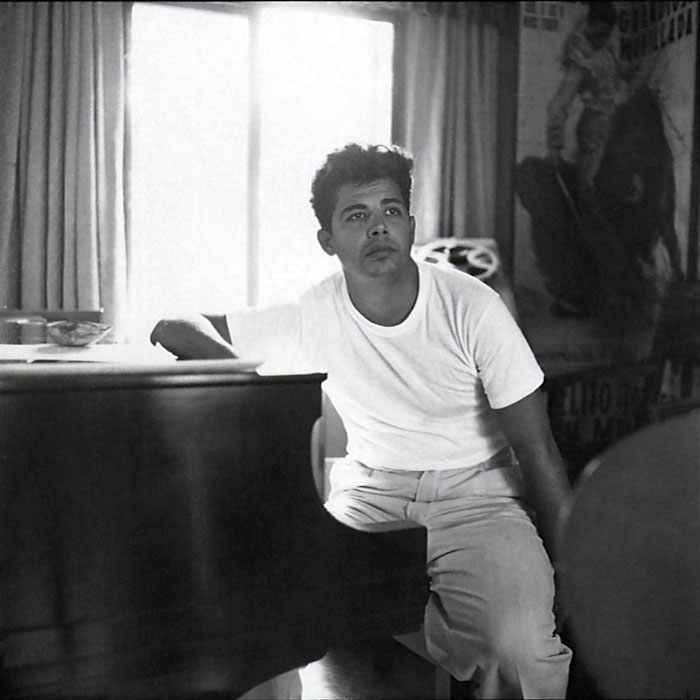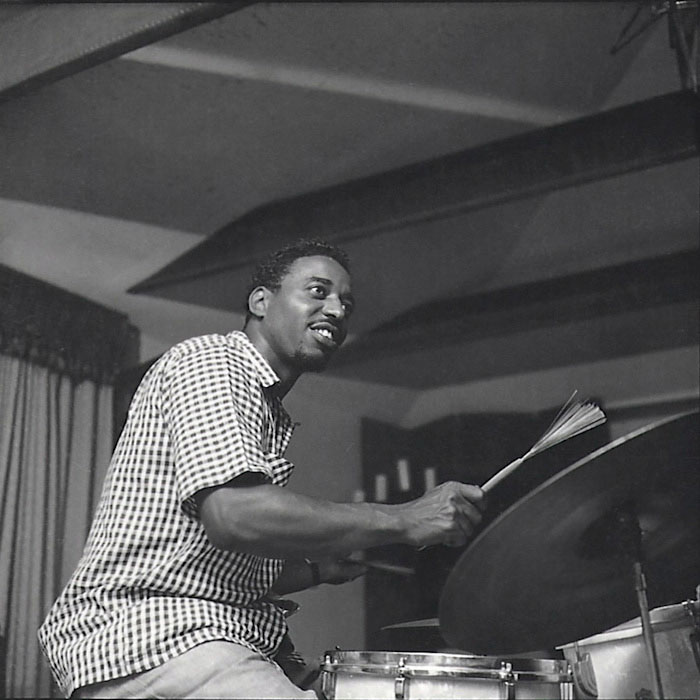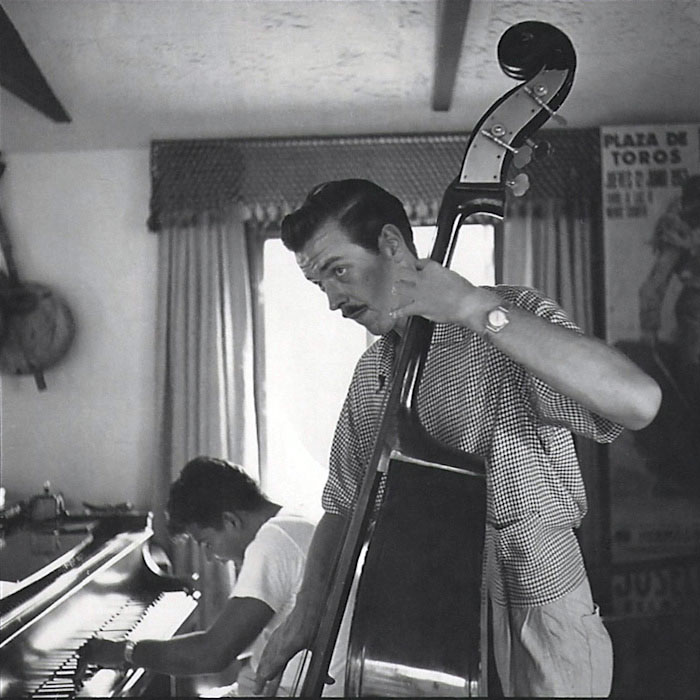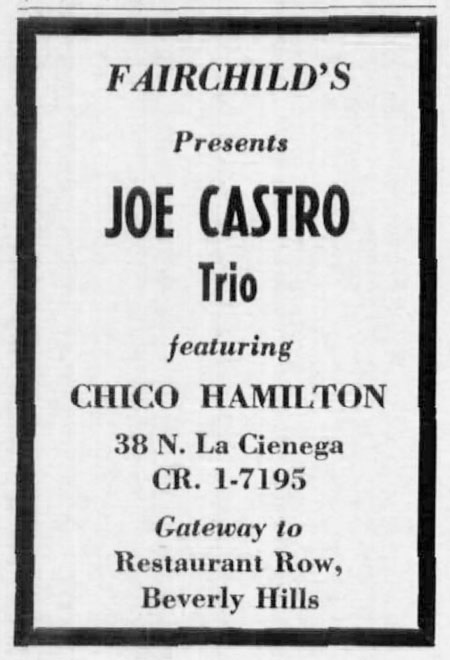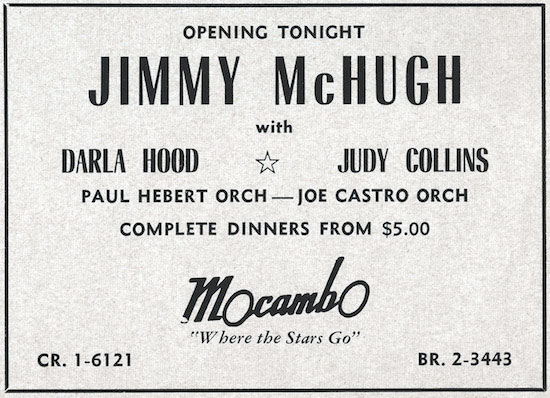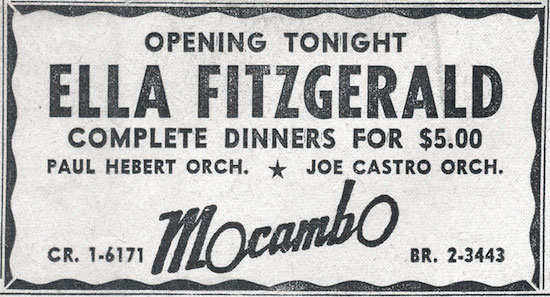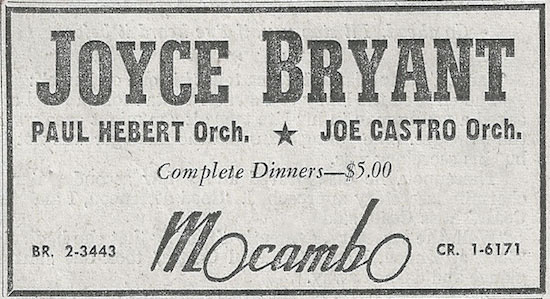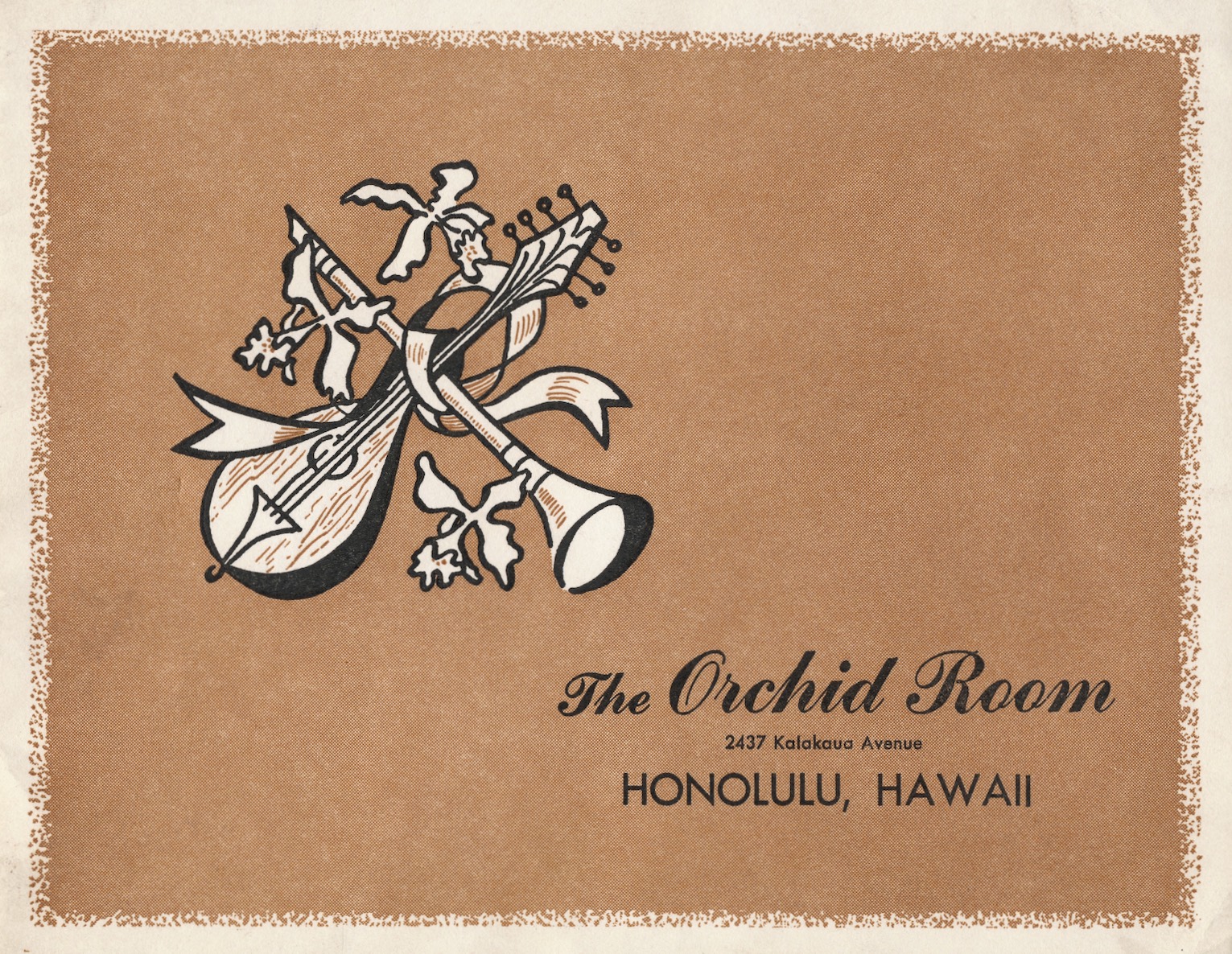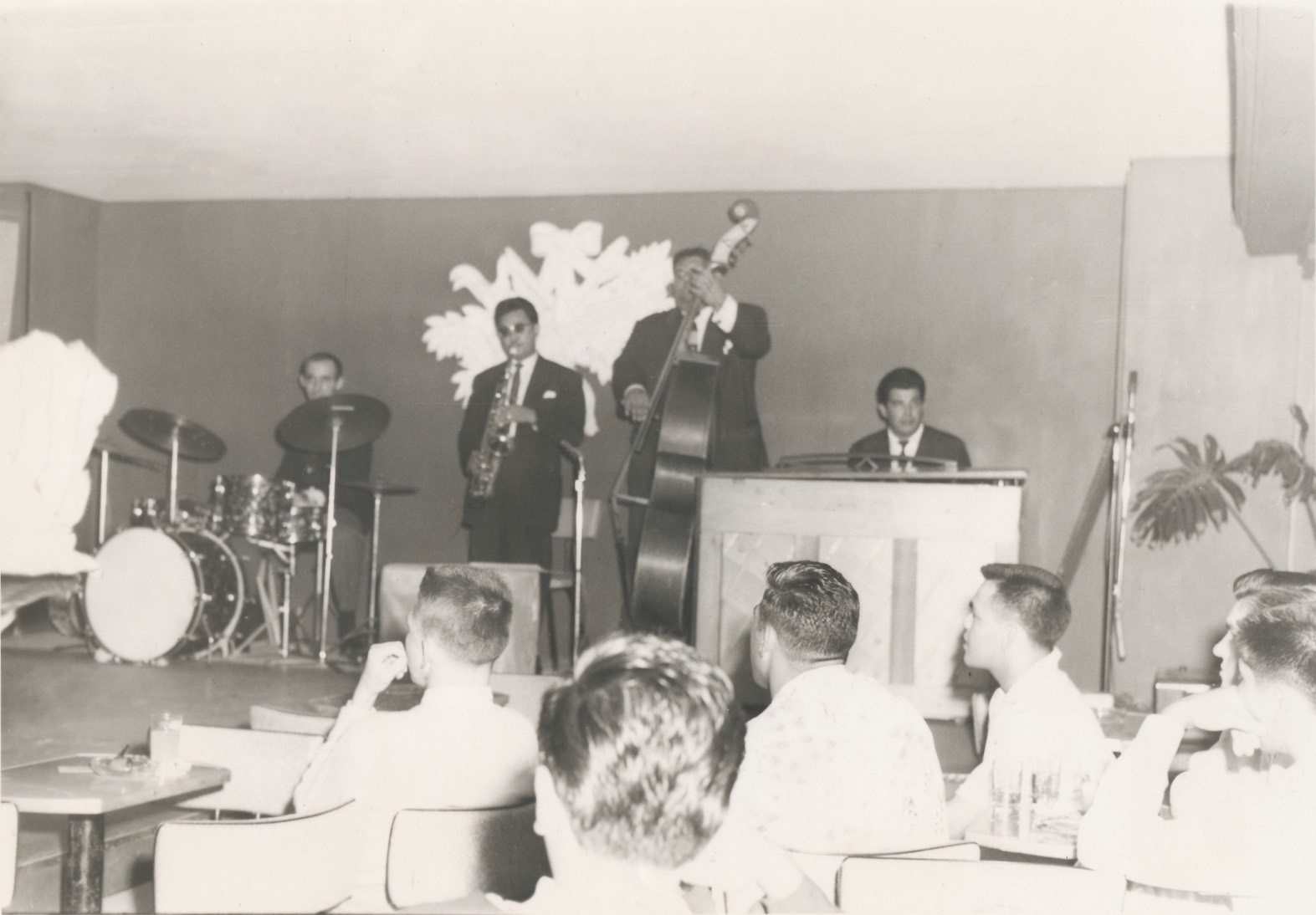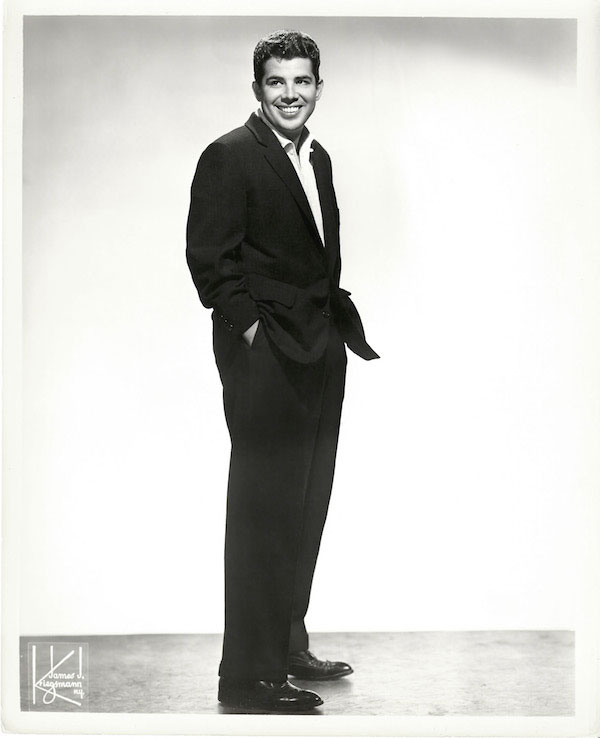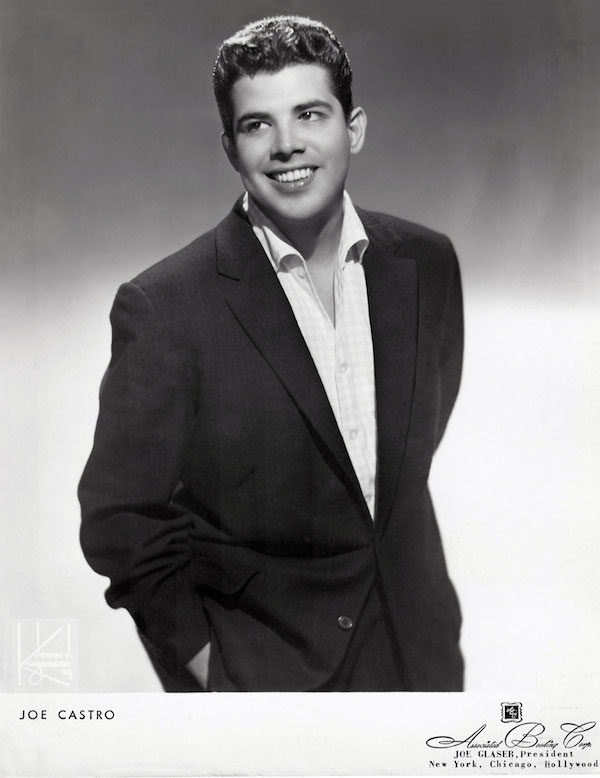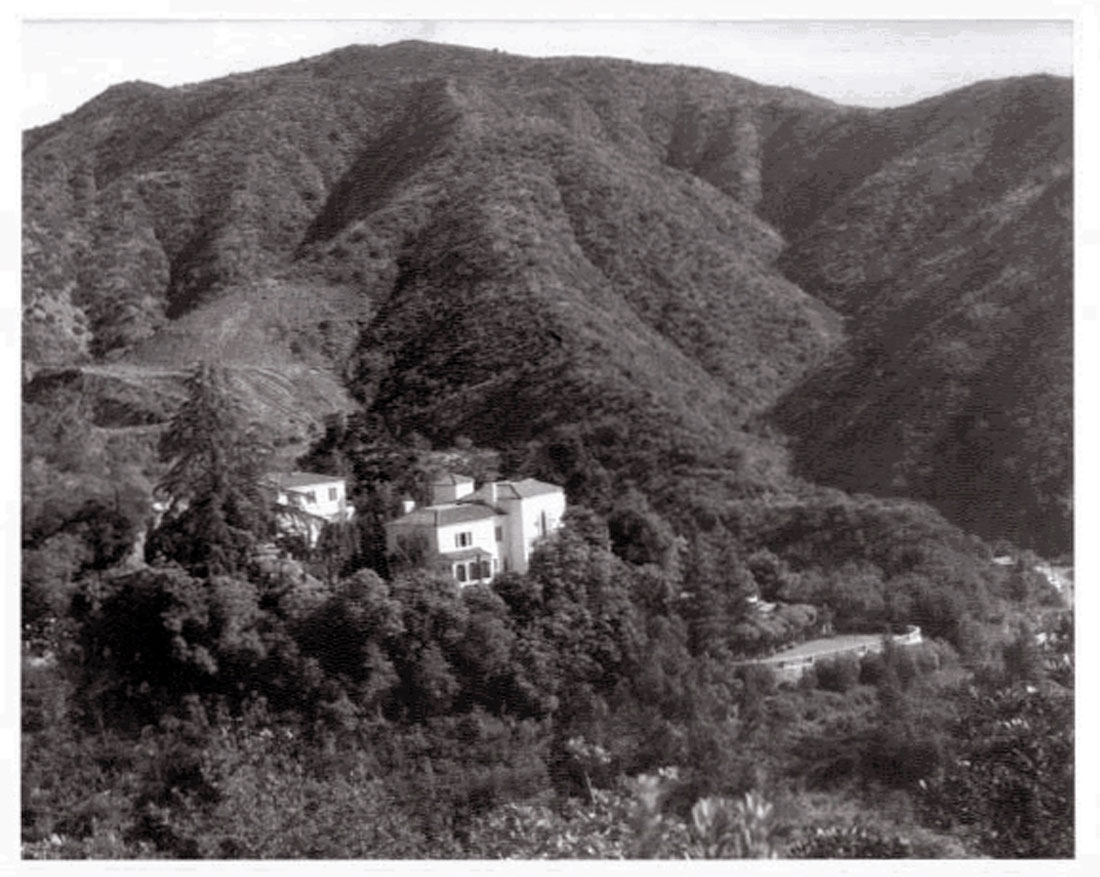
(My Love of Old Hollywood Collection)[•]
The first work that was undertaken was to set up a playhouse,[•] with music room, guest bedroom and bar, situated over the garage.[•] Duke hired decorator Tony Duquette to redo the décor. Three pianos were bought, two “Steinway Grand pianos Model L Ebony”[•] for the main house, that were put together for piano duets, just like the playhouse at Shangri La in Honolulu, one “Steinway Grand piano Model D Ebony”[•] for the playhouse. This became Castro’s regular residence and where Duke stayed when she was in California.
Castro:[•] When Doris built Falcon Lair, in the playhouse, she was constructing a recording studio for me. She had an idea of hanging a green curtain, like square around the piano and everything, to keep the sound out. Didn’t that sound go through that too? Then we tried big, antique lacquered containers. We tried it. You know it wasn’t really that successful. It was better to just have recording sessions where there was no outside noise or traffic or cars or anything. That’s the way she was trying to do it, you know.... That was one of the ideas there. We did have a lot of good sessions up there. We were very happy and loose. Of course, we never had pictures[•] of these things. We were too busy playing.
The playhouse was not ready when Joe Castro met Oscar Pettiford during his 1953 stay in Los Angeles,[•] but Oscar most likely came to Falcon Lair, hence the title of his composition The Pendulum at Falcon’s Lair that he would record at the end of the year. It is not known if Castro and Pettiford had met before[•] or if they were introduced by Harry Babasin.
Oscar Pettiford would record an EP with Harry Babasin for Imperial Records in June while in Los Angeles. The EP included the first version of his Blues in the Closet.[•] At the end of June, he would open at the Cable Car Village in San Francisco,[•] and then at Club Down Beat at the end of August.[•]
Duke and Castro traveled to Barcelona to find furnishings for their home in mid April.[•] Castro was subbed by Marco Rizo, who was a friend of Johnny Alvarez, at the Mocambo.
Wherever they travelled, they also dodged gossip columnists who asked about their relationship and their new Hollywood home. Dorothy Kilgallen wrote:
Doris Duke packed a breath-taking collection of furs for her trip to Europe. She’s become ultra-clothes-conscious since her romance with Joe Castro shifted into high gear. (But not SELF-conscious; she didn't even seem to notice the stares of the jazz aficionados when she and Joe did that uninhibited spooning at a Bandbox table a couple of nights before the departure date.)[•]
It was on this trip that Phil Benson first met Duke. Benson was in Paris on a Fulbright scholarship when Castro contacted him and invited him to visit in Barcelona. Castro offered tickets and Benson flew down.
Benson was introduced to a mysterious “Dorshka” at their hotel, allegedly she was a dancer who Castro had met. The trio made the rounds about town for a couple of days before Castro asked Benson what he thought of his girlfriend. Benson knew that the woman was quite a bit older than Castro but was very impressed by her personality and overall appearance.
That was when Castro let him know that the mystery woman was really Doris Duke.
Benson: “Who is Doris Duke?” I didn’t know who she was. Joe told me she was the richest girl in the world. I told him that that was interesting but I didn’t really care.
Benson’s unflappability to Duke’s wealth and status made him a trusted friend to the couple.
Upon returning to Los Angeles in mid May, Castro was back at the Mocambo leading his ensemble, which performed dance and Latin tunes.
With the playhouse completed, the sessions quickly began.
Castro reached out to Harry Babasin, to recruit musicians to come hang at the Falcon Lair sessions. Monty Budwig and Jimmy Pratt, were probably the first to be recorded (albeit poorly) on Thursday, September 10, 1953.[•]
Musicians recorded at Falcon Lair:[•]
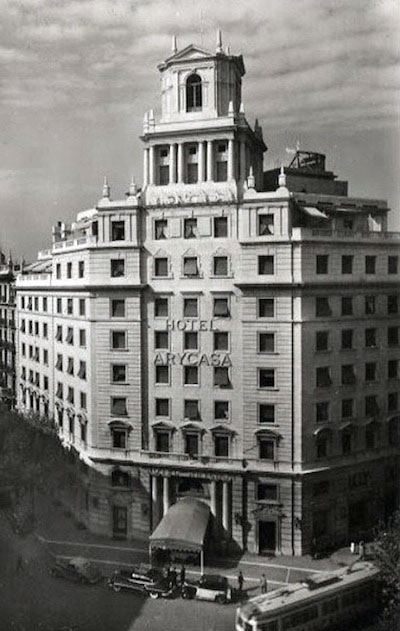
The sessions gave Castro an opportunity to really learn proper jazz from talented musicians and an outlet for his true musical love as the music that he played at Mocambo was “functional music, good but not jazz.”
Meanwhile, Castro had become tired of the work at Mocambo and suggested that Duke tour her own piano talents in Europe to experience the life of a touring musician. He had taught Duke some basic things for jazz piano. He convinced her that to be a real musician, you must play in public.
The only way Duke would do the tour was if they put together a group of people she could trust. She asked Castro to employ his brother Paul on bass, who arrived shortly after getting married, and their friend Phil Benson on saxophone.
Benson recalled that he was between semesters at the University of Minnesota, where he was getting his Masters degree. Castro called to present him the gig and, since he wasn’t otherwise occupied, Benson accepted.
The saxophonist was told to fly to New York to meet Dr. Laszlo, one of Duke’s many contacts, and get tickets for a flight to Barcelona with a vibraphone as freight.[•] When he arrived, Benson found the rest of the group holed up on the rented top floor of the Arycasa Hotel, where they would rehearse for a few weeks.[•]
Of course, they couldn’t tour as “Doris Duke and Her Band,” so they prepared a way to disguise Duke when they performed by having her wear a wig. The early press photos taken in Spain were staged with Castro’s bass playing brother’s wife Dolly on piano. The rest of the ensemble included saxophonist Phil Benson, Mocambo drummer Chick Moncayo, Paul on bass and Castro playing vibraphone.
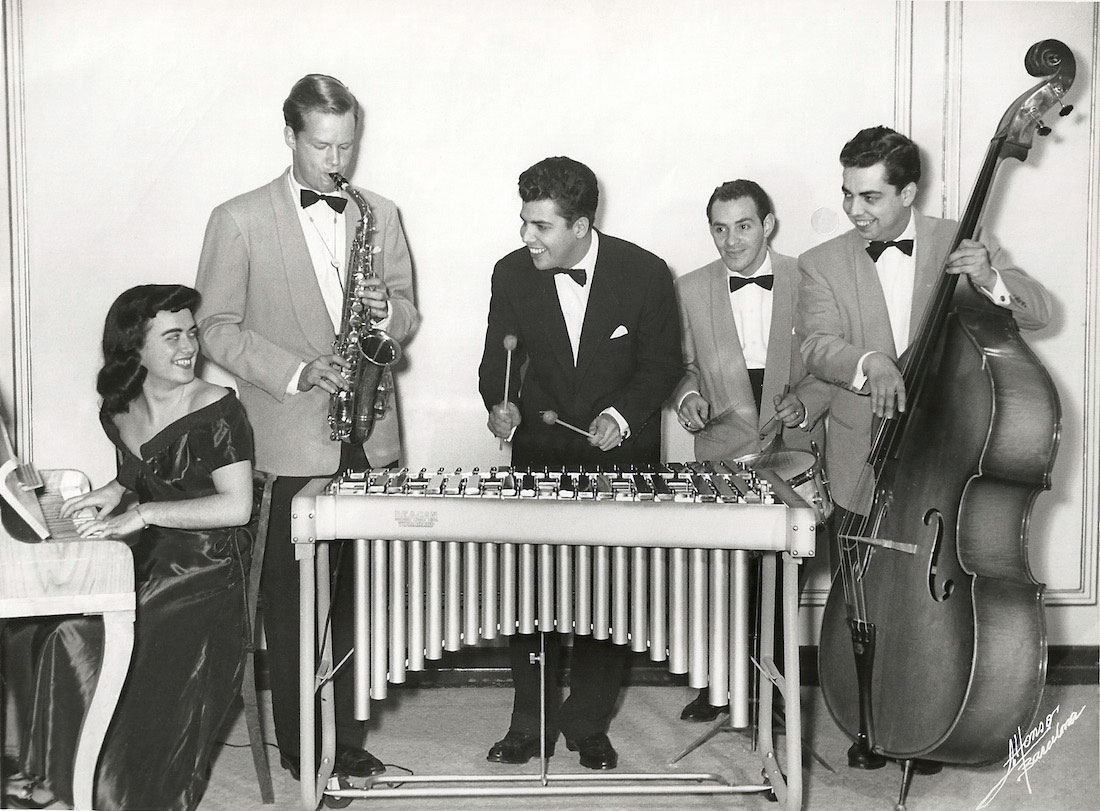
(James Castro Collection)
Benson remembered the experience well. He especially recalled Castro’s affinity for the good life. There were times when he’d line up the bell hops at attention at the hotel with a snap of the finger for $10. Castro would order extravagantly from room service. Though he loved the life Duke’s money was providing for him, Castro was also generous. Benson: “If Joe went out to buy a tie, he would have to buy one for you, too.”
Castro: We got one little free gig in the country…. We played one or two numbers. I remember coming back in a car, in some kind of bus with everyone. It was one of the most beautiful nights in the world ever in Spain. [The gig] wasn’t successful or unsuccessful. [Duke] wasn’t taking solos, she was comping…. She was getting along with Paul and she liked the guys.
They searched for other gigs around Europe until they were offered a job at a theater in Geneva, Switzerland called Le Palladium.[•] The ensemble remained there from roughly the end of December to mid January, while they had to rent a separate apartment for Duke away from the hotel because of the constant threat of the paparazzi.
There was a mention of the group in Time Magazine:[•]
Le Palladium – Geneva. In one of Switzerland’s flossiest nightclubs, the Palladium in Geneva, manager Jean Rings [and famous bandleader] formed a low opinion of the talent of the lady pianist playing with U.S. bandleader Joe Castor [sic] and his Hollywood Mocambo orchestra. The raven-haired lass, one Dolly Strayhorn [Duke’s alias], was plain butterfingered. Shortly after the orchestra wound up its two-week Palladium stand, Rings was awestruck to learn that pianist Strayhorn was none other than tobacco heiress Doris (“Richest girl in the world”) Duke, artfully slumming it, black wig and all, as a working girl.
Most of the band returned to the States at the end of January, Castro, Benson and Duke flew to Rome. They were following the former Katherine Dunham Company dancer Claude Marchant, another artist Duke supported, for performances with his troupe. They stayed at Hassler Hotel, met Nini Ruffine (one of Doris's singing teachers) and worked at her apartment. Joe wrote music for Doris, assisted by Benson, and arranged Fascinating Rhythm for Marchant’s routine steps.
Castro: One night Bricktop [a long time friend of Doris,[•] who was in Rome running her Bricktop club] got all the troops together with Claude and some of the cats.... The troops threw a wild dinner at Beseta’s (tbs) you know one of those afternoon really good restaurants and she and I did a version of It's All Right with Me by Cole Porter that she knew very well, we hadn’t heard the song then. I learned it and put it in her key and everybody was delighted with the performance except Doris she didn’t like it…. She was a little jealous, a trait I never picked up on, or maybe it was because I found out later that Bricktop sent the bill to the hotel for the whole party, which she had done on other occasions.
Benson said that after three months he had tired of the couple’s lifestyle and wanted to go home. Duke purchased a first class ticket for him that he traded in for a second class ticket and cash. Benson never talked about the experience much. Overall, he found Duke sort of a sad character who, though having access to everything, was only looking for a way to be normal. Benson believed that was why she was attracted to jazz music and Castro. He said that he wouldn’t trade places with her as her wealth also brought expectations and people asking for capital. A very difficult and strained life.
April saw the end of work at Falcon Lair and the registration of Oscar Pettiford's composition The Pendulum at Falcon’s Lair.[•]
The two continued to travel between California, Hawaii and New York, where they have been[•] at Basin Street in for Ella Fitzerald[•] and where they stayed for most of the summer until Castro landed a job in a trio with Harry Babasin and Chico Hamilton[•] at Fairchild’s[•] restaurant on La Cienega in Los Angeles.[•]
The summer also provided a number of opportunities for home recording at Falcon Lair.
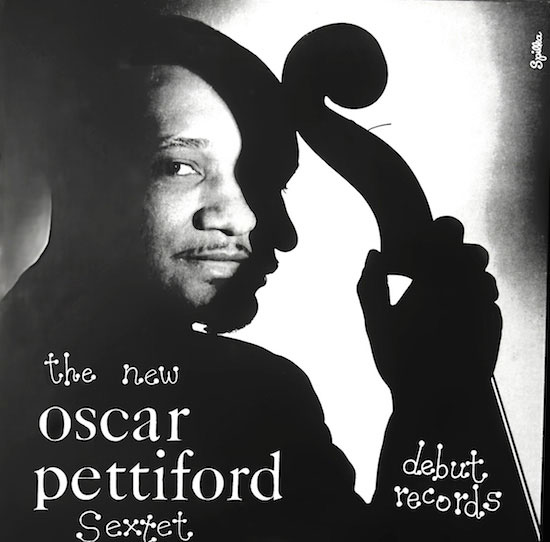
(Kees Hazevoet Collection)[•]
Musicians recorded at Falcon Lair:
Joe Castro piano. Possibly summer 1954.
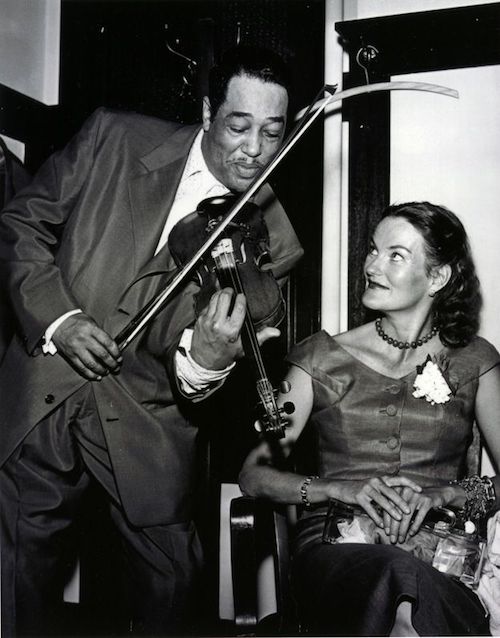
Monday, July 26, 1954,[•] by Howard Morehead (Jet Archives)
For the rest of the year, Castro appeared at Crescendo playing alongside big name acts like Billy Eckstine, went to Paris[•] and then regularly at Mocambo alternating his “Latin” group with Paul Hebert’s Orchestra. In the meantime, Castro would fly to wherever Duke was almost weekly.
Musicians recorded at Falcon Lair:
Joe Maini alto saxophone; Bill Dillard guitar; Bob Bertaux or Bob Whitlock double bass; Richie Frost drums. Sunday, November 21, 1954.
Jack Sheldon trumpet; Zoot Sims tenor saxophone; Joe Castro piano; Bob Bertaux double bass; Richie Frost drums. Probably late 1954.
The beginning of 1955 was much like the end of 1954 for Castro and Duke.
He was mostly performing with his dance group but the jazz sessions at Falcon Lair continued as well, with a number of surviving recordings. A trio was recorded on February 5, 1955, which probably was Castro’s first encounter with bassist Leroy Vinnegar, who was to become one of his best friends. San Jose born bassist/bassoonist Fred Dutton was also a close friend of Castro’s.
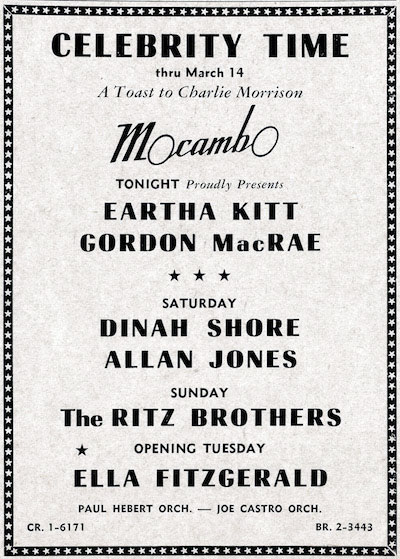
(James Castro Collection)
Musicians recorded at Falcon Lair:
Jack Sheldon trumpet; Zoot Sims, Ernie Chavez tenor saxophones; Bob Bertaux double bass; Hank Jaramillo drums. Possibly late 1954 early 1955.
Ernie Chavez, Bill Perkins, tenor saxophones; Joe Castro piano; Ralph Penã double bass; Jimmy Pratt drums.
Bill Perkins tenor saxophone; Bob Harrington piano; Ralph Penã double bass; Jimmy Pratt drums.
(Sextet) Jack Sheldon trumpet; Ernie Chavez, Bill Perkins tenor saxophones; Joe Castro piano. Possibly, 1st quarter of 1955.
Castro: “All this time we go back and forth to Hawaii jamming with local guys Eddie Shonk, Bruce Hamada....”
Gabe Baltazar describing the condition of jazz in Hawaii in the mid 50s:
Carmell Jones[•] and Johnny Griffin[•] came through. Johnny was stationed in Schofield [Barracks] during the Korean War, and he’d go down to Hotel Street and burn the clubs down, he was so hot. And we played gigs around town with the Orchid Room band…. Oh yeah, and we always looked for Joe Castro to come to town because, I don’t know if they were married or not, but Doris Duke had a beautiful mansion on Diamond Head, Black Point, and once a year Joe would come in with Doris. She’d come with her entourage, too, and every time they’d come to town the word would get by and we’d say, “Joe’s here,” and we’d have little jam sessions. Maybe one o’clock in the morning, after gigs, we’d go straight to Doris mansion and jam all night, until eight o’clock in the morning or until we just flopped down. And her place was an elaborate mansion. It was right on the ocean. You could hear the waves rolling in, smell the salt air. Had a Persian room, beautiful Persian rugs. Two Steinway grand pianos. It’s like Greek or Roman, like something out of a movie, with exotic flowers and marble pillars. And Doris would listen, I remember. She was kind of quiet. She didn’t say much. But she was always observing what was going on. She had also, I think, a black guy that was a dancer [Claude Marchant], and they’d be streaking across the pool in the moonlight, dancing, floating around like a ballet, because she was studying dance too. She loved the arts, and anybody that was artistic, I guess she’d just take them with her to travel around the world. Joe went with her, and his fine dancer too. He was a dance teacher, I guess. And I used to just play my horn, look on the side, and in the Hawaiian moonlight I can see the silhouette to two people dancing and prancing around the pool. That kind of thing. Yeah, then Joe would call the guy who takes care of the place, and he’d bring a couple of turkeys, man, he’d serve turkey, and we’d have sandwiches and salad and great food. It was a ball, and then they’d bring out the whiskey.[•]
At the end of August 1955, no more Mocambo.
A short trip to Duke Farms in New Jersey at the end of August provided an opportunity to record a quartet led by Castro featuring guitarist Jimmy Gourley.
Musicians recorded at Duke Farms:
A week later, Castro recorded a trio at Falcon Lair with Pratt and Red Mitchell.
Musicians recorded at Falcon Lair:
The long distance flights continued as Castro journeyed more and more between Los Angeles...
Musicians recorded at Falcon Lair:
...and New York, where he listened to Nat King Cole[•] three nights running with Doris at New York's Copacabana[•] and jammed at Duke Farms.
The jam sessions and their subsequent recordings weren’t entirely limited to the West Coast, and some, including an evening at Duke Farms, were even echoed in the press gossip:
Dorothy Kilgallen: The lucky few who've attended say the jam sessions at Doris Duke's mansion in New Jersey are better than most of the jazz you hear around Manhattan these nights. The cast usually includes such carefully selected stars as Gerry Mulligan, George Wallington and Zoot Sims, with an occasional civilian or two to lend enthusiasm from the side lines. Mrs. Henry Fonda appeared in the latter category at the most recent bash.[•]
Musicians recorded at Duke Farms:
Castro recorded regularly with a trio featuring Dutton and drummer Jimmy Pratt in Beverly Hills.
Musicians recorded at Falcon Lair:
Early January 1956 found Castro recording, once again, in New Jersey.
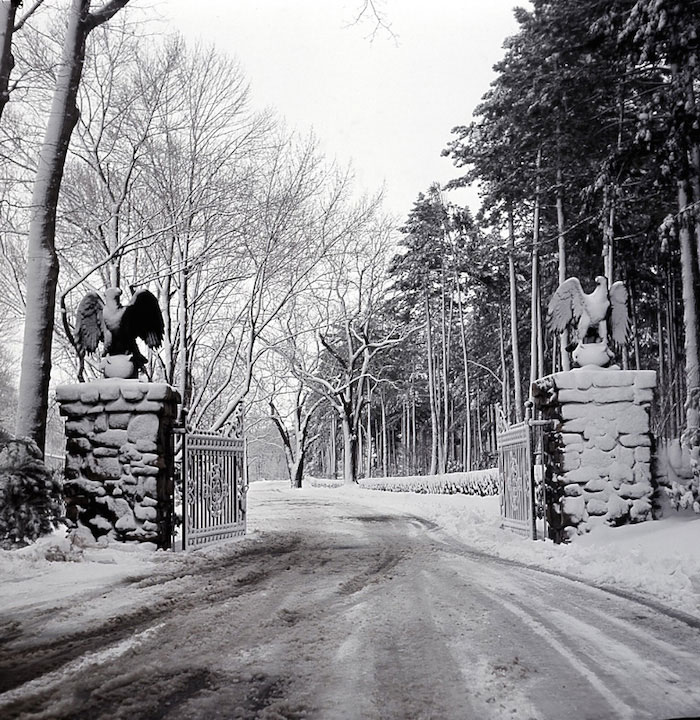
(James Castro Collection)
Musicians recorded at Duke Farms:
Saturday, January 7, 1956.
Duke and Castro remained social and were typically seen out and about in New York. These appearances were frequently mentioned in many gossip pages across the country.[•] He remained on the East Coast until February when he was back in Beverly Hills recording at Falcon Lair.
Musicians recorded at Falcon Lair:
One late night session on Feb. 17th had Castro hosting the Miles Davis rhythm section of bassist Paul Chambers and drummer Philly Joe Jones before their performance at the Pasadena Civic Auditorium[•] the next evening.
Musicians recorded at Falcon Lair:
Earlier that afternoon, Castro had played in a trio with bassist Red Mitchell and drummer Lawrence Marable.
Musicians recorded at Falcon Lair:
In New York during the month of March, Castro resumed his stay with Duke and it was probably during that period that the idea to start a record company had its germination:
Kilgallen: Doris Duke's current kick is making the jazz rounds long after midnight to invite the best of the musicians to her Jersey mansion for an after-hours jam session complete with snacks and drinks. She's had one room decked out like a recording studio, with the best equipment, and by now must have some marvelous collector's items on her tapes...[•]
Castro was back in Beverly Hills for his last sessions at Falcon Lair in mid April.
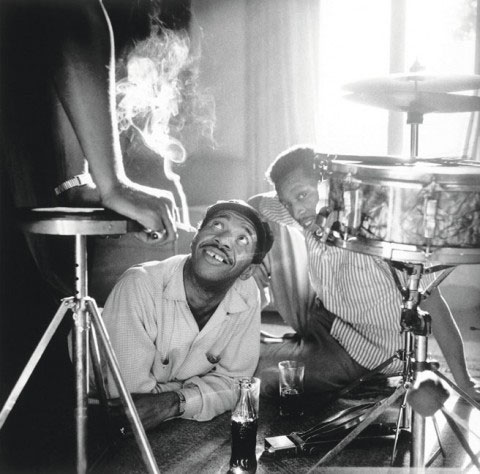
Musicians recorded at Falcon Lair:
It was in late April and early May that Duke’s intention to start a record label made the presses. It seemed that she was interested in recording both jazz and fledgling rock and roll acts with Castro as “the head of the firm”:
Kilgallen: ...he’s negotiating with Buck Ram, who wrote The Great Pretender, to get some of his acts for the new label.[•] Duke even went as far as to attempt buying out singer Joe Williams contract from Count Basie. [•]
Kilgallen again: The only thing holding up operations at Doris Duke’s new record company is the okay from the American Federation of Musicians....[•]
It was during the second half of April of 1956 that the “Zoot Sims with the Joe Castro Trio Live at the Falcon Lair”[•] was recorded. It was not recorded at Falcon Lair, however, but rather at Duke Farms in Somerville, New Jersey.
Musicians recorded at Duke Farms:
After a session at Duke Farms, Castro’s friend Teddy Wilson helped him reach Joe Glaser:
Castro: I’d go to Joe Glaser’s office, sit there with Peter Nero who was Bernie Nero then…couldn’t even get his subordinates…Teddy Wilson who I met was a friend of Doris, who gave her lessons, the famous pianist, took me up there and Joe Glaser took me under his wings which was great.
Musicians recorded at Duke Farms:
Joe Castro piano; Ed Shonk double bass; Sticks Evans drums. Saturday, May 12, 1956.
On Thursday, May 24, 1956, Joe Castro signed his first contract with a New York City club through the Associated Booking Corporation of Joe Glaser:
Associated Booking Corporation. Three (3) musicians. Leadership of Joe Castro - Basin Street, 209 West 51st Street, New York, N.Y. June 21,1956 thru June 30 1956 (Nine out of Ten Days) 9:00 p.m. to 3:00 a.m. Nightly (One hour intermission). $442.50 for week - Pro-Rata extra days. At the end of engagement.[•]
